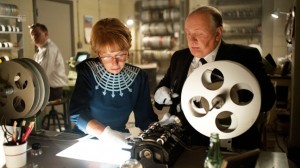Hitch and Alma
 More fun that a shower full of psychos. (And the LGBT Weekly link is here.)
More fun that a shower full of psychos. (And the LGBT Weekly link is here.)
Few directors have had a run of brilliance that Alfred Hitchcock had in between 1958 and 1963, when he directed in successionVertigo, North by Northwest, Psycho and The Birds; four of the greatest films ever made.
But surprisingly, Hitchcock was still racked by self-doubt during that period, terrified that he was not good enough; that he was being surpassed by younger directors; that he would never be accepted and praised by his peers.
It is the middle of this period, during the making of Psycho, that is the focus of Sacha Gervasi’s delightful movie about Hitchcock (Anthony Hopkins) and his wife Alma Reville (Helen Mirren), a screenwriter with whom Hitchcock collaborated on every film he made, whether she was credited or not.
Hitchcock opens with the wildly successful premiere of North by Northwest and Hitch (as Hitchcock was called) trying to find his next project, something that will not be what is expected of him.
This is why he turns down, for example, adapting Casino Royale, the James Bond novel, since British spy suspense was Hitchcock’s genre. Anxious and self-obsessed, Hitch is taking Alma for granted; this is established in an early scene when she asks him how she looks in a gorgeous suit and he replies dismissively, “Very presentable.”
Then Hitch discovers Psycho, both the novel it is based on and the true story of a Wisconsin serial killer that inspired the book. As he obsesses over making the movie, over its financing and casting and its appalling horror, Alma is distanced further, and she finds flirtation with the novelist and screenwriter Whitfield Cook (Danny Huston).
It doesn’t help that Hitch develops profound crushes on his blonde leading ladies, with Psycho’s star Janet Leigh (Scarlett Johansson) just the most recent. Jealousy, resentment, Hollywood politics, and the odd mechanics of making a film masterpiece propel the rest of the film.
While Sacha Gervasi’s direction is crisp and jaunty and uses Hitchcockian visual tropes both ironically and sincerely, the film works mainly because of John J. McLaughlin’s adaptation of Alfred Hitchcock and the Making of Psycho. He took what is essentially an intricate description of the making of a film and created a sweet, wry and moving story of a marriage between two brilliant artists.
But Gervasi and McLaughlin also have Hopkins and Mirren, who are both at their best, but for very different reasons. Mirren, unlike Hopkins, is never over the top; she is an actress who is almost always believable, her acting clear but subtle, her speeches powerful but never histrionic. Alma is not as great a role as Queen Elizabeth, but Mirren is as good in Hitchcock– sarcastic, exasperated, loving, confident and believable – as she was in The Queen, for which she won her Oscar.
Hopkins, on the other hand, is usually a ham. In this, he is imitating an iconic popular culture figure, one whose bugged eyes, odd pauses, and nose breathing are widely recognizable. With the help of most excellent prosthetic make-up, the imitation is striking and occasionally and deliberately funny, but it is beyond the ticks that Hopkins impresses, doing his best work since Remains of the Day.
In addition to the great impersonation, Hopkins communicates Hitch’s anxiety, neediness, love, lust, confusion and ambition.
Hitchcock
Directed by Sacha Gervasi
Written by John J. McLaughlin
Starring Anthony Hopkins, Helen Mirren and Scarlett Johansson
Rated PG-13